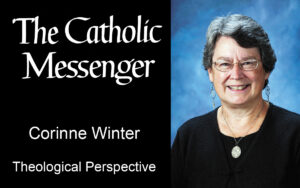By Corinne Winter
Recent discussions of immigration policy have highlighted the idea of a person’s “merit.” We should accept immigrants to this country, say many, not on the basis of quotas or on that of family connections, but on the basis of their ability to contribute to making the United States stronger, better…etc. Now it certainly makes sense that a person who has skills that are clearly needed by, for example, a particular company or community, that would be a factor in favor of that person’s being welcomed as an immigrant. The person immigrating under those circumstances will likely have a job leading to financial security and the ability to establish her or himself in a home and a community. On the other hand, an overemphasis on welcoming only those who have “merit” as highly educated and skilled individuals raises questions in the light of a Catholic perspective on human worth.
 The first principle of Catholic Social Teaching is the fundamental dignity and worth of every person as one who is created by God as an expression of God’s own love and goodness. This is a value that can be neither earned nor lost through a person’s own efforts. Further, our Catholic Tradition includes as a theological principle, that is, as a principle grounded in our understanding of who God is, the idea that we are called to make a Preferential Option for the Poor. While it would be naïve to assert that we should insist on bringing to this country everyone who lacks the basic necessities of life, it seems to me that, as Catholics, we are called to insert the principles cited above into the discussion on Immigration Policy.
The first principle of Catholic Social Teaching is the fundamental dignity and worth of every person as one who is created by God as an expression of God’s own love and goodness. This is a value that can be neither earned nor lost through a person’s own efforts. Further, our Catholic Tradition includes as a theological principle, that is, as a principle grounded in our understanding of who God is, the idea that we are called to make a Preferential Option for the Poor. While it would be naïve to assert that we should insist on bringing to this country everyone who lacks the basic necessities of life, it seems to me that, as Catholics, we are called to insert the principles cited above into the discussion on Immigration Policy.
Even the idea of “merit” needs to be examined. Any measure of merit needs to be subjected to rigorous analysis. Many of us may know companies, for example, that have a “merit pay” policy. Some of those policies seem to work justly, promoting the kinds of dedication and skill that will build up the company as a whole. Other systems seem more arbitrary, geared toward rewarding certain kinds of accomplishments, but failing to account for other kinds of effort and achievement that could well be considered equally beneficial to the same company. Or the way of measuring may be fallible. I hate to think, for example, that my failure to go online and fill out a survey saying I received excellent customer service means that a particular employee’s work will be deemed less meritorious. But one retail clerk suggested to me that such was the case.
Who would measure the merits of those applying for immigration and on what basis? We hear quite a bit about those with advanced degrees and/or technical skills, and those are easy to recognize. Would a community organizer who has fought effectively for the rights of workers also be thought to possess skills that our country needs? What about parents who have managed to raise and educate children in good health and with high moral values while working long hours for low wages?
Another question that I have about the rejection of current Immigration Policy has to do with so-called “chain migration.” A chain sounds like something to be avoided until I think about the fact that the chains under discussion are family relationships. Are family bonds a disvalue? I am sure that they can be abused or perhaps even falsified, but does that mean we throw them out entirely as a consideration for welcoming a person to this country?
Many of us are concerned about immigration and its effects on this country as well as on those who are coming here to establish new lives. The question of a truly just policy is huge and complex. The one thing on which I am sure we need to insist is that the merit of a person cannot be established only on the basis of a list of skills or qualifications to be checked off. It is a human process that must be grounded first and foremost in the conviction that every person has a certain absolute value as a human created by God.
(Corinne Winter is a professor-emeritus of St. Ambrose University, Davenport.)











